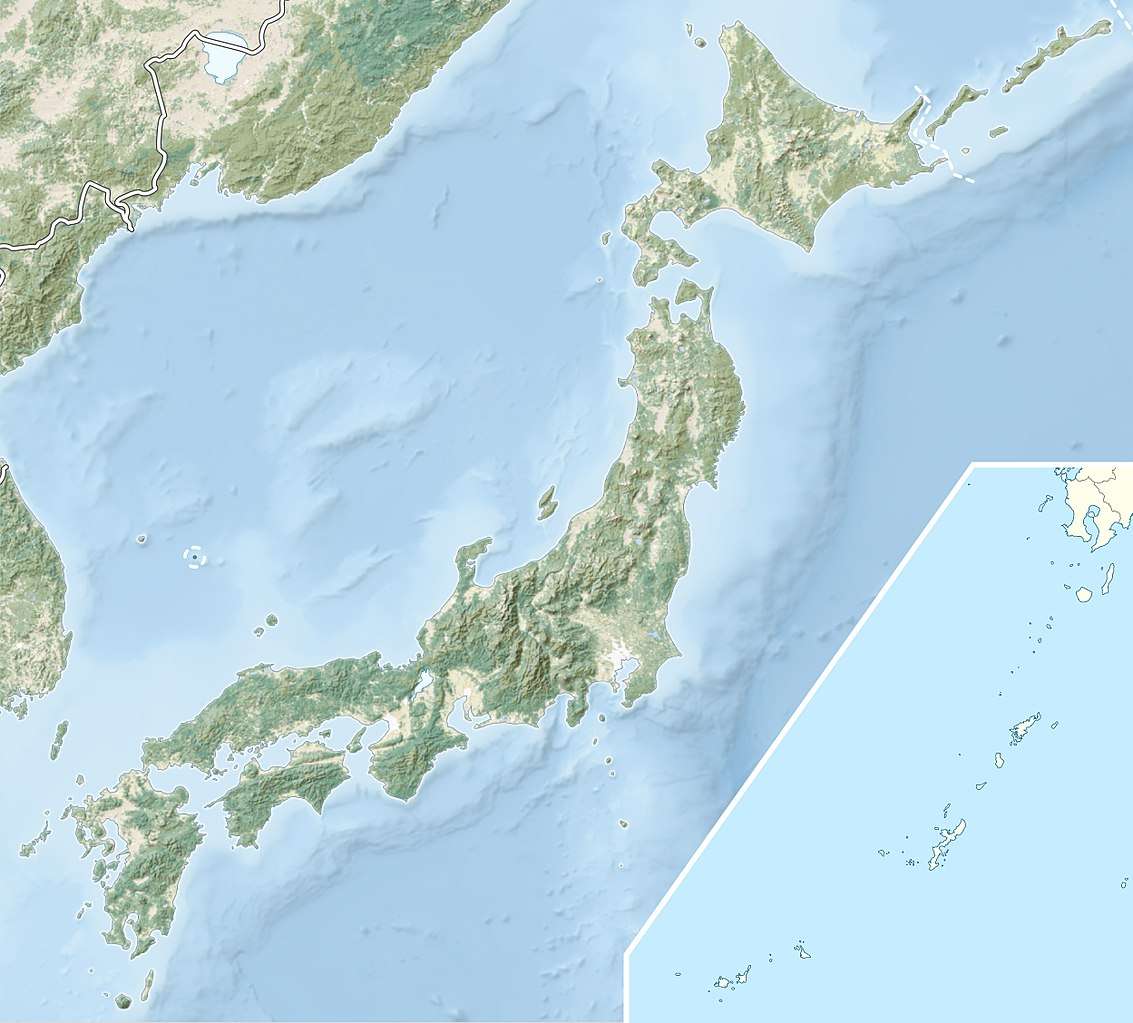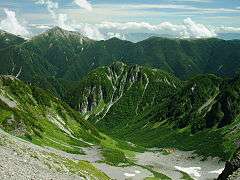Mount Jōnen
Mount Jōnen (常念岳, Jōnen-dake) is one of the 100 Famous Japanese Mountains,[3] reaching the height of 2,857 m (9,373 ft).[1] It is situated in Japan's Hida Mountains in Nagano Prefecture and in Chūbu-Sangaku National Park.[4] The shape of the mountain looks like the triangle. It can be seen from Azumi Basin.
| Mount Jōnen | |
|---|---|
| 常念岳 | |
 Mount Jōnen , Mount Yokotooshi and Azusa River in spring from Azumi Basin | |
| Highest point | |
| Elevation | 2,857 m (9,373 ft) [1] |
| Listing | 100 Famous Japanese Mountains List of mountains in Japan |
| Coordinates | 36°19′32″N 137°43′39″E [2] |
| Naming | |
| Language of name | Japanese |
| Geography | |
 Mount Jōnen Location of Mount Jōnen in Japan. | |
| Location | Azumino, Nagano and Matsumoto, Nagano, Japan |
| Parent range | Jōnen Mountains in Hida Mountains |
| Topo map | Geospatial Information Authority 25000:1 穂高岳 50,000:1 上高地 |
| Climbing | |
| First ascent | Walter Weston in 1894 (Mountaineering) |
Outline
This mountain is formed with Granite.[5] Before 1959 nine kinds of butterfly on high mountains can be seen around the mountain.[6][7] Colias erate and others can be seen now. The shape of the remaining snow of this mountain had decided the time when it farmed. The shape was called Jōnen-Bō (常念坊, Jōnen-Bō).
History
- Summer 1894: Englishman Walter Weston became the first man to climb on the top.[5][8]
- Summer 1906: Usui Kojima became the first Japanese man to climb on the top.[3]
- July 27, 1919: Mountain hut of Jōnen Hut (常念小屋, Jōnen-goya) was opened.[9]
- 1922: Kyūya Fukada stayed at the Jōnen Hut, and climbed this mountain.[3]
- June 1931: The double accident of the climbing mountain party and the rescue team occurred.[9]
- December 4, 1934: This area was specified to the Chūbu-Sangaku National Park.[4]
- 1993: Postage stamp of Jōnen Kasa with Matsumoto Castle was put on the market by the Ministry of Posts and Telecommunications (Japan).[10]
- May 28, 2007: NHK broadcasts the television program concerning Mount Jōnen in the series programs of excellent mountain in Japan.[11]
- September 10, 2010: NHK broadcasts the television program concerning Mount Jōnen and the high mountain butterfly.[7]
Mountaineering
Main ascent routes
There are three climbing routes to the top of the mountain.[12][13]
- Ichino River route
- Hie-Daira - Ichino River (一ノ沢, Ichi-no-sawa) - Munatuki-hachō - Jōnen Hut(Jōnen-Nokkoshi) - Mount Jōnen
- Mount Mae-Jōnen (前常念岳, Mae-Jōnen-dake) route
- Mitsumata(三股) - Hon river - Mount Mae-Jōnen - Mount Jōnen
- Traverses Route of Jōnen Mountains (from north and south)
- There are several stating points to climb.(Kamikōchi, Tokusawa, Yokoo, Mitsumata, from Mount Otensuo, and others)
Mountain hut
Thera are several Mountain hut around Mount Jōnen.[13] There is the Campsite on each hut.
- Jōnen Hut (常念小屋) - On the pass of Jōnen Pass (常念乗越, Jōnen-Nokkoshi) between Mount Jōnen and Mount Yokotooshi. It is one of the oldest hut in Japan.
- Mount Chō Hut (蝶ヶ岳ヒュッテ) - Near the top of Mount Chō.
- Yokoo Mountain Cottage (横尾山荘) - In Yokoo most in the north of Kamikochi.
- Daiten Cottage (大天荘) - Near the top of Mount Otensyo.
Geography
Nearby Mountains
It is on the sub ridge line of Jōnen Mountains in the southeast part of the Hida Mountains. There is a small peak of Mount Mae-Jōnen in the southeast by east.[13]
.jpg)
from Mount Jōnen

from Mount Hotaka
| Image | Mountain | Elevation | Distance from the Top |
Note |
|---|---|---|---|---|
 |
Mt. Yari 槍ヶ岳 |
3,180 m (10,433 ft) | 7.4 km (4.6 mi) | 100 Famous |
 |
Mt. Otensyo 大天井岳 |
2,921.91 m (9,586 ft) | 5.0 km (3.1 mi) | tallest mountain in Jōnen Mountains 200 Famous |
| Mt. Yokotooshi 横通岳 |
2,766.99 m (9,078 ft) | 1.9 km (1 mi) | ||
 |
Mt. Jōnen 常念岳 |
2,857 m (9,373 ft) | 0 km (0.0 mi) | 100 Famous |
 |
Mt. Mae-Jōnen 前常念岳 |
2,661.78 m (8,733 ft)[14] | 2.0 km (1.2 mi) | |
 |
Mt. Chō 蝶ヶ岳 |
2,677 m (8,783 ft) | 4.2 km (2.6 mi) | 100 Famous |
 |
Mt. Hotaka 穂高岳 |
3,190 m (10,466 ft) | 8.2 km (5.1 mi) | tallest mountain in Hida Mountains 100 Famous |
Source river
Each source river joins the main stream of Shinano River, then flows to the Sea of Japan.[13]
- Ichinomata Valley (Tributary of Azusa River)
- Jōnen River, Ichino River and Nino river (tributary of Sai (Nagano) River)
Gallery
 Mount Jōnen from Mount Yari
Mount Jōnen from Mount Yari Mount Jōnen and sunrise from Mount Yari
Mount Jōnen and sunrise from Mount Yari Mount Jōnen where it snowed from Mount Chō
Mount Jōnen where it snowed from Mount Chō Mount Jōnen in summer from Mount Mae-Jōnen
Mount Jōnen in summer from Mount Mae-Jōnen Mount Yari that turned red in autumn from Mount Jōnen
Mount Yari that turned red in autumn from Mount Jōnen
See also
References
- "Map inspection service of 25000:1 穂高岳". Geospatial Information Authority of Japan. Retrieved December 2, 2010.
- "Mountains altitude list in Japan(Nagano)". Geospatial Information Authority of Japan. Retrieved December 2, 2010.
- 100 Famous Japanese Mountains. The Asahi Shimbun Companyin. 1982. ISBN 4-02-260871-4.
- "Chūbu-Sangaku National Park". Ministry of the Environment (Japan). Archived from the original on February 27, 2012. Retrieved December 2, 2010.
- 日本山名辞典) [Dictionary of name of Japanese mountain]. Sanseido. 1992. ISBN 4-385-15403-1.
- 1000 Japanese Mountains. YAMA-KEI Publishers. 1992. ISBN 4-635-09025-6.
- "The back number of the program (Kita-Alps Mount Jōnen)". NHK. Archived from the original on September 26, 2011. Retrieved December 2, 2010.
- Walter Weston (2005) [1896]. 日本アルプスの登山と探検 [Mountaineering and exploration in Japanese alps] (in Japanese). Translated by Iwanami Shoten (new ed.). ISBN 4-00-334741-2.
- The story of mountain huts in Northern Japanese Alps. Tokyo Shimbun. 1997. ISBN 4-8083-0374-4.
- 100 Famous Japanese Mountains with postmark of stamp with the scenery. Hukurōsha. 2007. ISBN 978-4-89806-276-0.
- "Mount Jōnen on Eco channel of NHK". NHK. Retrieved December 2, 2010.
- Alpen guide Kamikōchi,Mount Yari and Mount Hotaka (アルペンガイド). YAMA-KEI Publishers. 2000. ISBN 4-635-01319-7.
- 山と高原地図 [Mountain and plateau map, Mount Yari, Mount Hotaka and Kamikōchi]. Shobunsha Publications. 2010. ISBN 978-4-398-75717-3.
- "Information inspection service of the Triangulation station". Geospatial Information Authority of Japan,(高山-上高地). Archived from the original on June 9, 2009. Retrieved December 2, 2010.
External links
